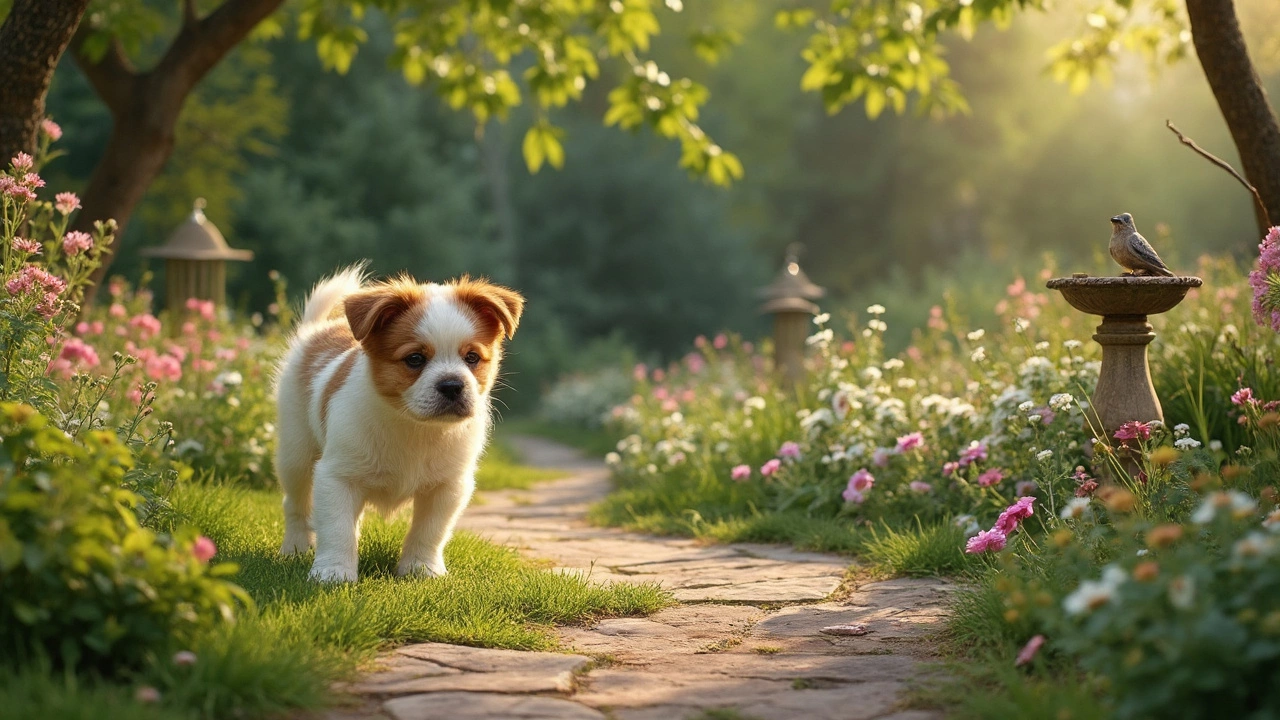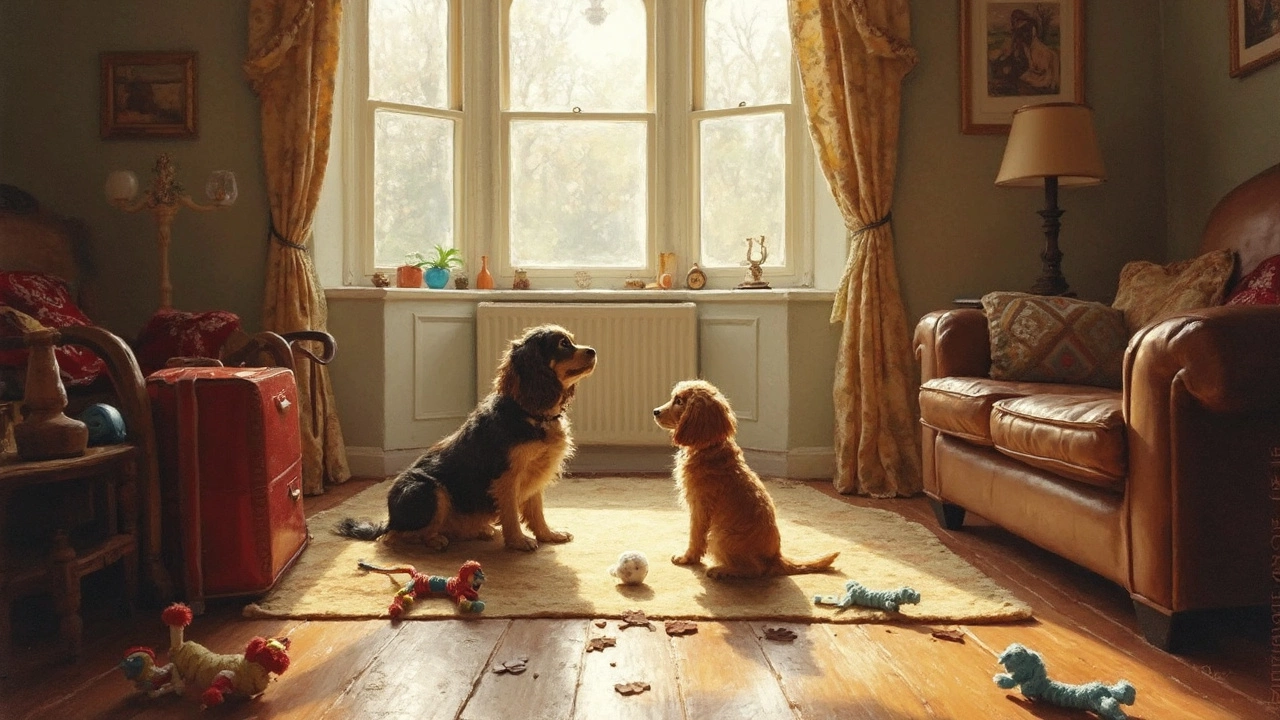Training a new puppy can be quite the rollercoaster ride, and the first big hurdle is usually potty training. No one wants little accidents all over the house, right? But how long does this whole process actually take?
Most puppies can start getting the hang of things around 12 to 16 weeks of age. But don't set your hopes on that magical timeline—we're talking about living, quirky creatures here, and they all have their pace. Factors like your pup's breed, personality, and how consistent you are with the training methods can significantly impact how long it takes.
Now, here's a tip: Consistency is your best friend. Make sure to take your puppy out at regular times each day, and don't skimp on the praise and treats. Speaking of treats, some pup-friendly toys can make training sessions a bit more fun. These little playthings keep your puppy engaged and can sometimes act as a rewarding distraction.
- Understanding Puppy Development Stages
- Factors Affecting Training Duration
- Effective Training Techniques
- Tools and Toys to Aid Training
Understanding Puppy Development Stages
Knowing the different stages of your puppy's development is essential for successful puppy training. Puppies, like humans, go through various growth phases. Being aware of these can help you in adapting your training methods effectively.
Neonatal Stage (0-2 weeks)
At this stage, puppies are pretty much helpless. They're blind, deaf, and rely entirely on their mother. Your role here is mainly making sure they stay warm and safe.
Transitional Stage (2-4 weeks)
Eyes and ears start opening, and puppies become more responsive to the world around them. This is when you'll start to see them attempt to walk. It's not really time for potty training yet, but it's great to start familiarizing them with different surfaces and new sounds.
Socialization Stage (4-12 weeks)
This is a critical time, not only for training but for your puppy's mental development. Introducing them to new people, animals, and experiences is key. Also, by 12 weeks, you might start seeing some semblance of routine in their behavior, making this a good time to kick-start serious training efforts.
Juvenile Stage (3-6 months)
Your pup is now more independent and curious, but consistency in training is still crucial. Between 3 to 4 months is usually a sweet spot for starting more in-depth puppy training because they can concentrate better. Most importantly, be patient—your furry friend’s attention span is still developing.
Understanding these stages isn't just helpful—it's essential for creating realistic expectations and strategies. Having the right puppy toys around can ease transitions and make each stage enjoyable for your little friend.
Factors Affecting Training Duration
When you're trying to potty train your new little bundle of fur, there's more in play than just setting a routine. Several things come into play when figuring out how long it's going to take before your puppy finally gets it. Let's dig into some of these factors:
Age of the Puppy
Puppies can generally start potty training around 12 weeks old. Before this age, they may not have full bladder control, which makes training a bit tricky. Younger pups might need more frequent potty breaks compared to older ones.
Breed Differences
You might be surprised to learn that some breeds are naturally better at picking up puppy training than others. For example, small breeds like Chihuahuas may take longer due to their smaller bladders, while larger breeds might catch on a bit quicker.
Consistency in Training
Inconsistency is a big training hurdle. Dogs thrive on routine. If they learn that they go potty outside at specific times, they start recognizing the pattern. So, sticking to a schedule can make the process a lot smoother and faster.
Environment and Living Conditions
The location where your puppy spends most of the time plays a role as well. A pup living in an apartment might need more effort for potty training than one with a backyard. Outdoor environments provide a space where puppies quickly learn boundaries.
| Breed | Average Training Duration |
|---|---|
| Labrador Retriever | 4-6 weeks |
| Beagle | 4-8 weeks |
| Toy Poodle | 6-10 weeks |
Use of Puppy Toys as Training Aids
Here's a cool trick: Utilize puppy toys as rewards. Engaging your puppy with toys during and after successful potty sessions can positively reinforce good behavior. It keeps them motivated and turns training into a playful experience.
At the end of the day, remember that accidents happen, and patience is key. Taking time to consider these factors can help set realistic expectations for both you and your pup, making the experience less stressful and more rewarding.

Effective Training Techniques
When it comes to potty training, having the right strategies in place can make life a lot easier. First off, let’s talk about timing. Puppies thrive on routine, so establish a schedule that includes regular bathroom breaks, especially after meals, naps, and playtime.
Consistency is Key
The most important thing is to stay consistent. Puppies learn best when they’re rewarded for doing the right thing, so every time they do their business outside, make a big deal out of it. Give them lots of praise and maybe a treat. Over time, they'll associate going outside with positive reactions from you.
Watch for Signs
Your puppy can’t tell you they need to go, but they can show you. Look for signs like sniffing around, circling, or squatting. These cues mean it's time to head outside. The quicker you respond, the more they learn what’s expected.
Crate Training
Crate training can be a great way to help with potty training. Dogs naturally avoid messing where they sleep, so keeping your puppy in a crate for short periods can encourage them to hold it until you take them outside. Just make sure the crate isn't too big. It should be just big enough for them to stand, turn, and lie down comfortably.
Accidents Happen
No matter how diligent you are, accidents will happen, and that’s okay. Clean up the mess without making a fuss. Use an enzymatic cleaner to eliminate any odors—otherwise, your puppy may return to the same spot thinking it’s okay. Remember, patience is part of the process.
Keep It Fun
Don’t forget to make training enjoyable. Use puppy toys to keep them engaged and entertained. Toys can serve as both a reward and a tool to help transition your puppy from playtime to potty time smoothly.
Monitoring Progress
| Age (weeks) | Potty Needs (hours) |
|---|---|
| 8-10 | Every 1-2 hours |
| 11-14 | Every 3-4 hours |
| 15+ | Every 4-6 hours |
Each puppy is unique, but keeping track of their progress can help you understand their natural schedule. This can also help increase the time between potty breaks as they grow.
Tools and Toys to Aid Training
When it comes to potty training, a few smart tools and toys can make a world of difference. These items aren't just for play; they're great for keeping your puppy on track and stress-free.
Essential Potty Training Tools
Let’s start with the basics. An essential tool for any puppy parent is a set of durable pee pads. They're lifesavers for those rainy days when even the most patient puppy doesn’t want to go outside. Another handy tool is a puppy gate to keep your furball confined to one area while they’re still learning.
If you're looking to monitor your puppy's progress, a potty training chart can be useful. Record their successes and setbacks, and you might begin to see patterns in your puppy’s habits.
The Magic of Toys in Training
No one can resist a good toy, especially puppies! Introducing toys during potty training can motivate your pup and provide a positive association with the process. Here are some favorites:
- Puzzle toys: Stimulate your puppy’s mind and keep them busy. A tired puppy is a well-behaved puppy.
- Interactive balls or squeaky toys: Great for rewards after successful bathroom breaks. A quick game of fetch or tug-of-war can be the perfect positive reinforcement.
- Teething toys: Puppies love to chew, and teething toys can keep them from chewing on the wrong things while distracting them after potty breaks.
Using Treats and Clickers
Never underestimate the power of a reward. Small, tasty treats are great motivators. Pair these with a clicker to help your puppy associate the sound with positive behavior.
If you're wondering if all this works, consider this little nugget of info: According to a recent pet training survey, over 75% of dog owners found that consistent use of toys and rewards drastically shortened their puppy's potty training period.
Incorporate these tools and toys into your training routine, and your puppy will not only have fun but also learn faster. Remember, patience and perseverance, along with a few clever tricks, can turn a daunting task into a fun bonding experience.
